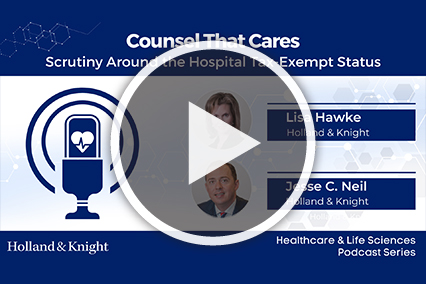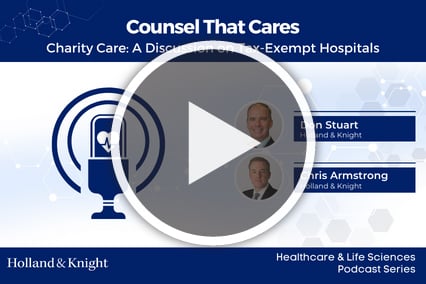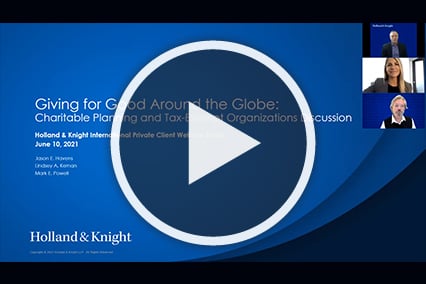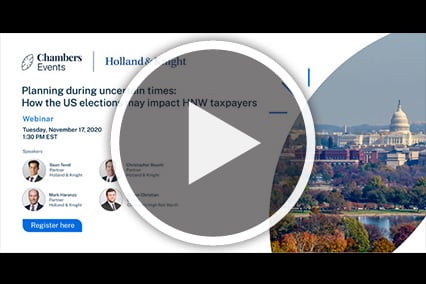Nonprofit and Tax-Exempt Organizations
- Holland & Knight has a deeply engrained culture of collaboration, client service and efficiency, as well as integration across multiple practice groups and industries. Few law firms have our combination of experience, knowledge and market capabilities with nonprofit transactions.
- Members of Holland & Knight's Nonprofit and Tax-Exempt Organizations Team, many of whom hold advanced Master of Laws degrees in tax and some of whom have worked at the U.S. Department of the Treasury or IRS, have an in-depth understanding of nonprofit corporate governance, finance law, and the tax laws and regulations that are unique to exempt organizations.

Overview
While nonprofit and tax-exempt organizations enjoy special tax advantages, the rules and regulations governing them are complex and ever changing. Holland & Knight's Nonprofit and Tax-Exempt Organizations Team is on the leading edge of these evolving rules and can help your organization successfully navigate through them. Our deep bench of knowledgeable attorneys provides clients with comprehensive legal representation, ranging from matters exclusive to tax-exempt organizations, such as excise taxes, intermediate sanctions and unrelated business taxable income, to those common to all business entities, including employment law, real estate leasing and intellectual property issues.
Our attorneys can provide guidance on recent developments that impact tax-exempt organizations, including an increased IRS focus on governance and tax issues for exempt entities, the revised IRS Form 990 that considerably increases required disclosures and the active interest of state attorneys general in the operations and activities of tax-exempt organizations. We counsel clients on these issues along with all other aspects of their operations and can effectively guide them through the intricate legal issues faced by their organization.
Comprehensive Counsel to Broad Client Base
Holland & Knight's Nonprofit and Tax-Exempt Organizations Team provides comprehensive legal counsel to our clients by drawing on the knowledge and experience of team members as well as other attorneys and professionals throughout the firm. We will work with you to assemble a customized team of lawyers based on your specific legal needs.
Our team represents a wide range of nonprofit and tax-exempt organizations, such as :
- colleges and universities
- donor-advised funds and community foundations
- healthcare providers
- membership organizations
- museums and other cultural institutions
- political organizations
- private and charter schools
- private foundations
- private operating foundations
- public charities, including national and international organizations
- religious organizations
- research organizations
- social clubs
- social service agencies
- student exchange organizations
- trade and professional associations
With respect to international organizations, we have in-depth experience providing advice to U.S.-based entities conducting activities outside the U.S., as well as foreign entities conducting activities in, or generating income from, the U.S.
Tax Law
Tax law considerations are critical to nonprofit and tax-exempt organizations in order to obtain and preserve their tax-exempt status. Failure to comply with tax rules may result in penalties imposed on the officers, directors and key employees of tax-exempt organizations and can also jeopardize the organization's tax-exempt status. The experienced tax lawyers on our team have an in-depth understanding of the IRS and will guide your organization through complex tax rules to maximize the benefits of your tax-exempt status while safeguarding against potential challenges. We regularly advise clients on:
- intermediate sanctions and "excess benefit" transactions
- IRS audits, examinations and controversies
- IRS regulations and rulings
- lobbying and political activities, including applicable restrictions and elections
- partnerships and other joint ventures between exempt organizations or between an exempt organization and a non-exempt organization
- private foundation rules, including provisions on self-dealing, excess business holdings, mandatory distributions, jeopardy investments and taxable expenditures
- private inurement and private benefit prohibitions
- reasonable compensation and excess executive compensation issues
- rules on supporting organizations and donor-advised funds
- unrelated business taxable income
Compliance Audits
Members of Holland & Knight's Nonprofit and Tax-Exempt Organizations Team provide clients with comprehensive legal representation, ranging from matters exclusive to tax-exempt organizations, such as fundraising regulations, endowments, spending policies and conflicts of interest, to those common to all business entities, including employment law, real estate leasing and intellectual property issues. We are dedicated to helping ensure that your organization complies with all necessary laws and guidelines, and that it is run in an efficient and effective manner, consistent with nonprofit best practices, to successfully accomplish your organization's mission.
In today's business climate of increased regulation, oversight and enforcement, companies need effective compliance and ethics programs. Holland & Knight has extensive experience in assessing our clients' particular risks in the nonprofits sector. Our goal is to work with you to create and implement an effective compliance and ethics program structure that meets your legal obligations, educates your workforce, allows your management to better understand and avoid potential regulatory and enforcement risks, and provides a mechanism through which you can respond to regulatory and compliance issues.
Corporate Law and Governance
Our team regularly assists clients in creating tax-exempt organizations and in guiding them through the exemption application process. Once the entity is formed, developing and adhering to proper governance procedures is vital for tax-exempt organizations. The revised IRS Form 990, the annual tax return for exempt organizations, places more focus on governance issues than ever before. Because your organization's Form 990 is available to the public, your answers to the "good governance" questions and financial disclosures will be reviewed by your prospective donors, especially those considering a substantial donation or bequest. It may also be examined by state government officials, the media, self-appointed "watchdogs" and others with an interest in your organization.
Our attorneys can assist you in conducting internal reviews of your governance procedures to help you develop best practices that meet current standards. This process may include the preparation and adoption of governance guidelines, amendments to bylaws, committee charters, conflict-of-interest policies, document retention policies, "whistleblower" policies, grant procedures, indemnification policies and ethical conduct statements. We can advise the directors and officers of your organization on their fiduciary responsibilities, as well as indemnification and insurance issues.
We can also advise you in complex corporate transactions such as mergers of exempt organizations; formation of tax-exempt or for-profit subsidiaries; creation of a separate charitable foundation to accompany an existing non-charitable organization; contractual relationships between exempt and non-exempt organizations; asset transfers between exempt organizations; transactions between exempt organizations in the same state or in different states; agreements with professional fundraisers, corporate sponsors and other organizations; and termination of exempt organizations. In addition, we regularly advise tax-exempt organizations on issues pertaining to lobbying and political activities.
Finance, Fundraising and Donor Issues
Finance and fundraising efforts are critical to nonprofit and tax-exempt organizations, especially in today's economic climate. Members of our team regularly advise such organizations with respect to endowment policies, finance issues and agreements with donors. In addition, we provide Section 501(c)(3) tax opinions in tax-exempt bond financings and advise clients on the use of tax credits to finance schools.
We are keenly aware of the practical challenges of raising additional funds. Holland & Knight has deep experience in supporting organizations, including some of the largest in the country, that can add millions or even billions of dollars to the existing assets of community foundations or other tax-exempt organizations. We have long-standing relationships with a number of supporting organizations, with whom we have collaborated to facilitate very substantial charitable gifts to community foundations and other public charities. Through these existing relationships, we can help tax-exempt organization clients build assets, along with providing legal advice to protect what our clients already have. We have implemented these structures for numerous clients, helping drive hundreds of millions of dollars in support of charities' missions. Through these opportunities, we help to add substantial assets instead of focusing only on the incremental growth and protection of the assets that you already have.
Our team can provide you with the resources needed to comply with the laws governing charitable solicitation and fundraising. We are well versed in federal tax law requirements related to fundraising as well as state charitable solicitation statutes. In addition, our team regularly renews and amends registrations and resolves disputes with state agencies.
We can advise you on the management of endowment funds and gifts and the restrictions relating to endowments. Because charities often ask for gifts to be used as an endowment without understanding the restrictions that apply to the use of endowment funds, we assist clients in developing effective endowment policies and statements of investment policy. We also advise clients on their fiduciary obligations relating to the investment of charitable assets, including the specific rules relating to private foundations and charitable split-interest trusts.
Our lawyers protect the interests of organizations named as beneficiaries in charitable bequests and estate planning documents. This effort also protects the interests of the charitable donors. Because many charities lack the staffing to monitor the progress of trusts and estates in which they are beneficiaries, we can provide you with valuable assistance in expediting the distribution of funds and reviewing the actions of the executor or trustee to assure that your organization receives the full amount of the gift as intended by the donor.
Permissible Grantees. We regularly advise clients on the types of entities to which grants may be made without exercising expenditure responsibility, as well as how to determine the tax-exempt status and classification of potential grantees. We also provide advice regarding withholding obligations in making certain grants and determining the status of a grantee for withholding purposes.
Scholarship/Agency/Giving Circle Funds. Our nonprofit team has extensive experience in assisting with the creation of scholarship programs, reviewing programs to ensure compliance with approved scholarship procedures, and designing and administering scholarship pools for colleges and universities to allow for accomplishment of otherwise improper restrictions (based on race, gender, etc.). We also provide advice on structuring and offering services to giving circles, as well as planning and drafting fiscal sponsorship arrangements.
Specialized and Unique Gifts. Donors may seek to transfer all manner of gifts to charity. Our lawyers advise clients in the risks that are inherent in certain types of gifts, ways to mitigate such risks and the best practices for acceptance of all types of gifts.
UPMIFA. Experienced attorneys from our team were directly involved in the American Bar Association's efforts to assist with the creation of the Uniform Prudent Management of Institutional Funds Act (UPMIFA). One of our team members also served as a state liaison to the Uniform Law Commission (historically known as the National Conference of Commissioners on Uniform State Laws) for Florida's consideration and enactment of UPMIFA. We have applied our UPMIFA knowledge and experience to benefit charitable organizations across the country.
Donor-Advised Funds and Community Foundations
Our team has extensive experience assisting sponsors of donor-advised funds (DAFs), from creating the public charities that will sponsor their own DAFs to advice centered on the rules enacted by the Pension Protection Act of 2006 to using DAFs in high-net-worth families' estate planning. We also have created DAFs on behalf of private foundations, either to pursue a specific goal, such as international grantmaking, or to terminate a private foundation into a DAF.
Private Foundations
Private foundations are subject to unique rules and restrictions governing their operations. We can advise you on issues including annual distribution requirements, rules on domestic and foreign grant-making, and the prohibitions against self-dealing, jeopardizing investments, excess business holdings and taxable expenditures.
We have advised scores of private foundations and, following the enactment of the Pension Protection Act of 2006, public charities (that sponsor DAFs and particular supporting organizations) in connection with their expenditure responsibility requirements. A significant number of those matters revolve around international grant-making, given our strong international tax and estate planning practices. We also have addressed such issues in the litigation context when necessary.
Trust Law
Some exempt organizations are created as trusts rather than corporations. In other cases, an exempt organization may be the beneficiary of a trust. When trust law issues arise, our experienced trust lawyers can provide you with counsel relating to trust law issues, including the fiduciary obligations of trustees.
Employee Benefits and Employment Law
For many nonprofit and tax-exempt organizations, human capital is the organization's most precious resource. Members of our firm's Labor and Employment Group can assist you with employment-related issues such as job descriptions and postings, employment contracts, noncompete contracts, employee benefits, business immigration, employment discrimination, occupational safety and health, trade secret and intellectual property protection, whistleblower claims and more.
Employment law issues can intersect with tax law because excessive compensation of key employees may result in IRS penalties on the recipients as well as on the organization managers who approved the transaction. Our attorneys can advise you about "safe harbors" and other means of avoiding a determination of excessive compensation, as well as employment "best practices" for exempt organizations.
Intellectual Property Law
Intellectual property may be one of the most valuable assets of a nonprofit or tax-exempt organization, especially for colleges, universities, research organizations and healthcare organizations. Holland & Knight has a team of attorneys who concentrate their practice in intellectual property and can help you protect such property through patents, copyrights, trademarks, licensing and other agreements that safeguard your rights.
Litigation
Even organizations that do good works are sometimes involved in legal disputes. Fiduciary conduct and liability issues may arise in the course of normal business operations. For example, hospitals, schools and other organizations that deal with the public are exposed to a variety of legal claims, including injuries that may occur on the premises and alleged misconduct on the part of employees.
Holland & Knight's litigation and dispute resolution attorneys have extensive experience in conducting internal investigations and defending organizations when claims are brought against them. Some of our lawyers focus on representing nonprofit organizations before the IRS or state officials who regulate charities. We can advise you when claims are asserted against your organization or your directors, officers or other fiduciaries.
We endeavor to help our nonprofit clients avoid litigation, but when a dispute cannot be resolved through other means, our team has the knowledge and experience to handle any litigation that may arise.
Public Policy Trends
Holland & Knight's Washington, D.C.-based Public Policy & Regulation (PP&R) Practice Group, the lobbying arm of the firm, is one of the most experienced and well-respected government relations practices of any law firm in the U.S., with more than 100 practice members. We combine a boutique consulting approach with the resources of a larger firm and do our utmost to deliver positive policy results and a clear return on investment.
Unparalleled Local Government Experience. Through our work representing cities, counties and other municipal entities, Holland & Knight has developed a strong foundation in all issues that matter to local governments. Our policy experience is bolstered by our strong relationships with federal departments and agencies, the White House, and every House and Senate committee and subcommittee important to local governments. We are able to partner with nonprofit and tax-exempt clients to craft legislative, regulatory and political strategies that advance their goals and priorities as they evolve.
Bipartisan Relationships. Holland & Knight has built a successful government affairs practice through our depth of experience – and by maintaining our bipartisan ties year after year, election after election. We nurture longstanding relationships with the administration, congressional committees and congressional leadership on both sides of the aisle.
Team-Based Advocacy. Another key to our effectiveness is that our PP&R Group is team based. We dedicate the personnel with the necessary relationships and substantive knowledge to the matter at hand. This organizational structure provides clients with a significant advantage that does not exist with many other firms, which tend to operate as independent actors or have meaningful relationships with only one body of Congress or one political party.
Coalitions. Unlike most other firms, Holland & Knight offers nonprofit and tax-exempt clients a campaign-style approach to advocacy. We have a rich history of establishing and executing thought leader/validator advocacy campaigns, local partnerships, successful grassroots campaigns and coalitions. In fact, in the past several years, Holland & Knight has successfully led more than 30 coalitions and ad hoc efforts, bringing together divergent interests to rally behind a broader message to affect legislative or administrative changes.
Profile-Raising Success. We have been successful in positioning clients as national leaders on issues of importance and taking local objectives and turning them into national policies. Through our strong relationships with think tanks, foundations, business and private sector associations, labor organizations, minority leadership groups and other thought leaders, Holland & Knight has successfully built coalitions and broadened support for policies and projects of importance to our clients, leading to favorable legislation and media attention.
Seamless Extension of Your Team. Working together, Holland & Knight acts as an extension of nonprofit and tax-exempt clients' teams. We are available 24/7 and aim to function as our clients' Washington, D.C., office. We are proactive in our efforts and communications with our clients and consistently create new opportunities to highlight and support our clients' priorities with Congress and the administration.
Real Estate Law
Nonprofit and tax-exempt organizations often require a physical location to carry out their work. Our colleagues in Holland & Knight's Real Estate Practice can assist with issues such as leasing, acquisition and disposition of property, and contract drafting and negotiation. Our team can also provide counsel on issues specific to nonprofit organizations, such as rules governing low-income and student housing as well as obtaining and preserving real property tax exemptions. Because the terms of a real estate transaction may affect your organization's exposure to unrelated business income tax, we can help you to structure transactions in the most appropriate manner possible.
Lawyers on Your Side
Our Nonprofit and Tax-Exempt Organizations Team includes multiple partners who are recognized by Best Lawyers in the area of Nonprofit/Charities Law and who are Fellows of The American College of Tax Counsel and/or The American College of Trust and Estate Counsel. In addition, Holland & Knight was ranked Tier 2 for Tax Not-for-profit (Fortune 1000 Private Foundations, National Trade Associations and Charities) in The Legal 500 United States 2025 guide.






